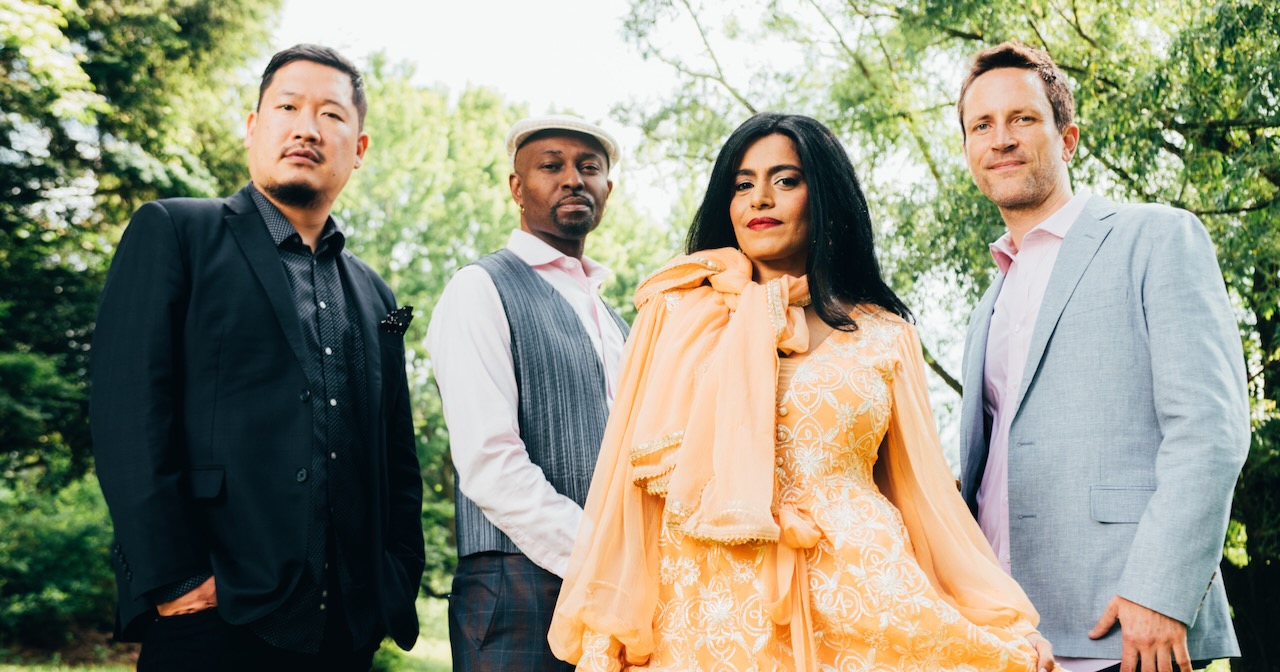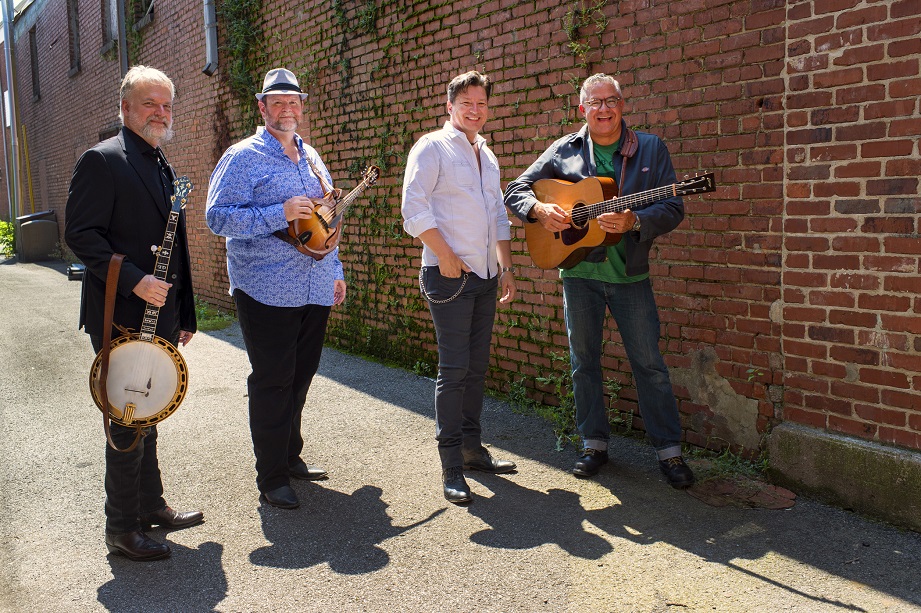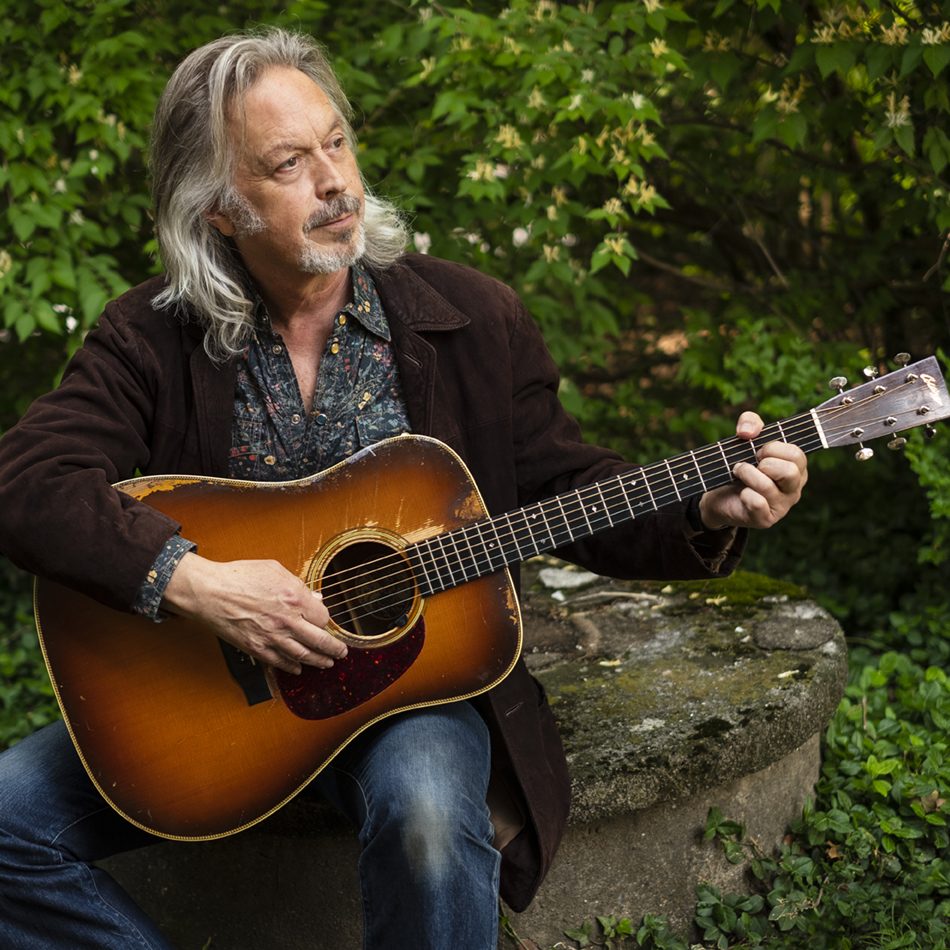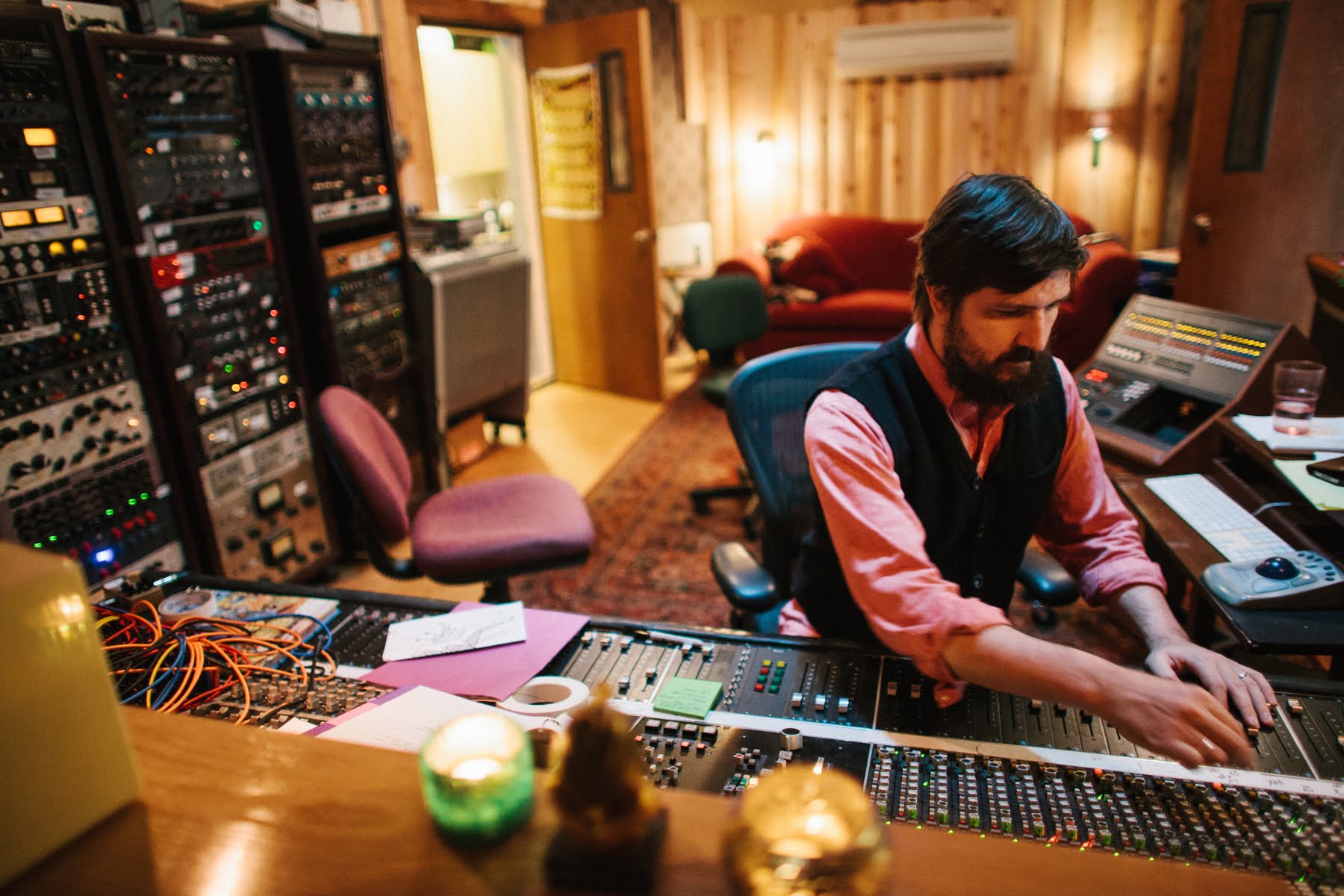The members of American Patchwork Quartet present an array of diverse backgrounds – both musical and cultural. The group is made up of Clay Ross, multi-Grammy winning guitarist and founder of Gullah group Ranky Tanky; Grammy-winning Hindustani classical vocalist, Falguni “Falu” Shah; internationally acclaimed jazz bassist, Yasushi Nakamura; and Juno Award-winning drummer, Clarence Penn. However, even with the variety of identities and backgrounds they do represent, the ensemble makes it clear in their live performances and in every conversation they have that “APQ” is not a group made for the sake of some exaggerated or token sense of unity. Despite their most prominent accolades and individual backgrounds, this group isn’t a concept band or a supergroup made for shock value.
American Patchwork Quartet was born from a foundation of genuine friendship forged between four people connecting with one another, rather than four musicians immediately rushing to talk shop. It was from there that interest in the differences the way each of them interact with and understand music, inspired the idea to form “APQ.” The group would discover through their curiosity things both mutual and unique to their relationships with music – as well as things mutual and unique to their shared identities as Americans. It’s this aspect of APQ’s bond that made American folksongs the bedrock of their repertoire for performances and their newly released, self-titled debut, which includes longstanding American folk fare like “Shenandoah,” “Wayfaring Stranger,” “Gone for Soldier,” and “Beneath the Willow.”
Through an abundance of performances that have taken them to various regions of the U.S. – and now an album of painstakingly arranged and honed songs – APQ is prepared to show and tell how individuals such as themselves can be connected through contrast. They showcase how folk music can tell specific stories of people, places, and times and can stay true to its past while adopting a new present and future – just the way one does when immigrating to somewhere new.
After attending one of APQ’s performances, I connected with the group to share their story with the diverse community of BGS and beyond, speaking with guitarist-vocalist Clay Ross and vocalist Falu Shah. Our conversation, via Zoom, stretched between New York and Arizona, just days before the group embarked on a cross-country album release tour, which kicked off in Princeton, New Jersey on February 9.
What brought you all together to form a quartet, particularly one that’s driven by more than the aim to “make music for a living?”
Clay Ross: It really started with my relationship with Falu [Shah]. We were working at Carnegie Hall as teaching artists. At least twice a week we’d be together either writing songs or developing a curriculum to teach our students and we really enjoyed being together and we enjoyed becoming friends.
At that time, I was [also] getting Ranky Tanky started and doing a lot of research in the folk archives of Alan Lomax, Guy Carawan and other ethnomusicologists that collected songs from across the United States. One day, I asked Falu, “Tell me what you think of this song, ‘Pretty Saro.'” She listened to it, loved it, and she learned it. Then we learned how to sing it together. We just felt like “Wow, this is something really special!” And we liked the idea of collaborating.
Around the same time, I met Clarence Penn at the Monterey Jazz Festival. We ended up on this flight that got canceled on the way back to New York. So we were in this airport for 10 hours, talking and bonding over all these life things and not about music at all. We became friends first, which was a really great way to start a collaboration. I said, “We need to find a bassist,” and we both immediately thought of Yasushi Nakamura – one of the first musicians that I ever played with when I came to New York 20 years ago. Clarence was playing with him that whole time and they’re like brothers. Yasushi is a family man, he’s got two kids, and so we’re all really connected beyond the music. We connected as people and we can relate to one another as parents and as human beings.
I think between meeting Clarence and knowing that I wanted to deepen this collaboration with Falu somehow, that was where the idea [for APQ] was born. I felt like, we’re all American, you know? That’s the one thing that connects us, no matter how different we are and how radically different our pasts and our backgrounds may be. We are now all connected as Americans and so we all have some access and an entry point into these American folksongs. They can be a part of our story now, whether they were a part of our traditions up until now or not.
Falu, as both a U.S. immigrant and a vocalist primarily trained in Indian classical rather than Western music, how was your experience in becoming part of APQ?
Falu Shah: For me, American folk music was something my mother only played records of. I grew up in India, in Mumbai, and my mom was a big fan of Bob Dylan and Emmylou Harris and growing up she played this music, which I found absolutely intriguing. We only had one one record store in the entire city of Bombay and it was called Rhythm House. My mom had to travel 45 minutes in a train to get to this record store, stay there, and stand in a line for four or five hours. She would bring Michael Jackson and I would think, “Oh, my goodness, why would you bring me all these [records]?” And she said, “Because I want you to have a broad vocabulary of music, not just Indian classical.”
The biggest difference I found in both music styles is harmony. Sometimes I feel Western music is very delighted to use chords. And harmony context was very different for me. Clay used to tell me to sing in a different key. And I’m like, “How do I sing like that?” It’s a different style of learning. So in Carnegie, when we were doing all the songs and all the writing, Clay used to always switch harmonies, and I thought, “I really like this concept.” That was the first thing that intrigued me: that Clay would never sing what I sang – he would always find another note and he would completely change the melody of that song, but it sounded so beautiful when layered together. I had to unlearn a lot of things to learn how to sing [American folk] music. So my journey has been always as a student. I still consider myself as a student and I’m always going to APQ concerts and rehearsals thinking, “What can I learn this time?”
How does APQ decide on repertoire to explore, interpret, and perform?
FS: Clay will send me a song and I will find a folk melody or an [Indian] classical raga that is close to it. And if it’s not, then I’ll tell Clay, “I don’t like this song.” …When I told Clay, “I love this, I don’t like this,” it’s based upon this [idea] of what can I as an immigrant and Indian person, what can I bring to this song that already doesn’t exist? There are so many people who have already sung it and they have sung it so beautifully. What am I adding? Something has to relate because our cultures are so different. For us to break the boundaries of continents and lines between us, we had to connect with the beautiful harmony of music.
CR: I’m looking for songs that are spiritual and not religious – and that celebrate man’s humanity to man. And that speak to the universal qualities of all people – be it love, nature, heartache and longing, loss, or joy.
How do you balance the idea of APQ’s music existing as “teaching tools” or “portals to history” with the idea that music can and should be entertaining?
CR: It’s an organic process of creation that I gravitate towards things that are both entertaining and fun. And [things that] also have a depth and that can guide you into a whole world – whether it’s history or emotional exploration. Because really, for me, I’m trying to live. I’m trying to live in those big questions of like, “Why are we here? Where are we headed? Where have we been? What does it all mean?”
How has the journey been working with one another toward the goal of inspiring enthusiasm and curiosity around multiculturalism through folk music?
CR: I think any endeavor you embark upon with other people, and it doesn’t matter if they’re your own family and your own blood, it’s always a negotiation with oneself… and learning to appreciate the positive surprises that come out of it.
FS: [Clay, Clarence Penn, and Yasushi Nakamura] know rock and they know jazz and they know the [American] culture. I had to do research. I have to give [Clay] microtones that are proper to the mood of the song. Indian music is very balanced and very thought out. I had to have chemistry with Yasushi and Clarence. I kept telling Clay, “I need to understand more to play with them.” I’ve always tried to figure out my journey as a musician.
CR: I think that [Falu’s] persistence is what gave [APQ] life. She could have very easily had an attitude of “I don’t do this.” Falu has had to bend far more than we’ve had to bend to her. The frame of what we’re dealing with is American music. She’s adapted to that frame. I think that process in and of itself is what this band is about. We’ve definitely had to tap into our best human qualities to get to this music. I’m so proud of this music just for this reason, for what it represents, what we’ve had to live to arrive at this document, this album, that we have now.
Where do you think folk music can find its place in a world that often looks ahead, rather than stopping to contemplate who and what’s around us in a meaningful and lasting way?
CR: I think folk music will continue to exist in a place of meaning and quality. [Folksongs] may be ignored in the short term, but in the long term they will remain. We all just have to do our best to find our tribe of people who appreciate what we do… I feel this is an album that is a document that will last, because people can go back to it.
FS: I feel folk music is always going to be amazing, because it is by the people, for the people. And it’s inherited from generation to generation and something that’s worked for 400 years. There is no doubt about it. Our children’s children are going to listen to and learn and sing ‘Shenandoah’ – I guarantee it – because it the power of folk music is so unique and so important and strong that if it has worked for 400 years, I don’t know why it would not work for another 400 years or more.
Photo Credit: Sandlin Gaither



